
Frontiers in Water
Scope & Guideline
Exploring the depths of water science and technology.
Introduction
Aims and Scopes
- Water Quality and Treatment Technologies:
Focused on the development and evaluation of innovative technologies for water purification, including biological treatment methods, chemical processes, and advanced filtration techniques. - Hydrology and Water Resources Management:
Examines hydrological processes, watershed management, and the impacts of climate change on water resources, emphasizing sustainable practices and policy implications. - Water-Energy-Food Nexus:
Investigates the interconnections between water, energy, and food systems, addressing challenges and opportunities for integrated resource management and sustainability. - Climate Change Impacts and Adaptation Strategies:
Explores the effects of climate variability on water systems and the development of adaptive strategies to enhance resilience in water management. - Community Engagement and Social Dimensions:
Highlights the importance of community involvement in water management and governance, focusing on social equity, gender issues, and participatory approaches. - Technological Innovations and Monitoring:
Covers advancements in monitoring technologies, including remote sensing, machine learning, and IoT applications for real-time water quality and quantity assessments.
Trending and Emerging
- Integrated Water Resource Management (IWRM):
A growing emphasis on IWRM approaches that consider social, economic, and environmental factors in water management decisions is evident, reflecting a holistic understanding of water systems. - Impact of Climate Change on Water Systems:
Research focusing on the implications of climate change for water availability, quality, and management is increasingly prominent, highlighting the urgency of adaptation strategies. - Nature-Based Solutions (NbS):
There is a rising interest in NbS for addressing water challenges, including flood management and water quality improvement, showcasing innovative and sustainable practices. - Emerging Contaminants and Water Quality Monitoring:
Studies addressing the detection and management of emerging contaminants, such as microplastics and pharmaceuticals, are becoming more frequent, reflecting growing public and regulatory concern. - Community-Led Water Governance:
Research focusing on participatory governance models and community engagement in water management is gaining traction, underscoring the importance of local knowledge and stakeholder involvement. - Data-Driven and Technological Innovations:
The integration of machine learning, remote sensing, and data analytics in water research is increasingly prominent, reflecting the field's move towards more sophisticated and efficient monitoring and management techniques.
Declining or Waning
- Traditional Water Resource Assessment Methods:
There is a noticeable decline in the publication of studies focusing solely on conventional water resource assessment techniques, as researchers increasingly adopt advanced modeling and data-driven approaches. - Single-Dimensional Studies:
Research that only addresses isolated aspects of water management or quality without considering the broader interconnections within the water-energy-food nexus has become less frequent. - Historical Water Management Practices:
There seems to be a diminishing interest in studies that solely focus on historical water management practices, as contemporary research shifts towards innovative and adaptive strategies. - Local Case Studies with Limited Generalizability:
Papers focusing exclusively on localized case studies that do not aim for broader applicability or cross-regional insights are becoming less common, as the field moves towards more universally applicable findings.
Similar Journals

H2Open Journal
Fostering collaboration for global water solutions.H2Open Journal, published by IWA Publishing, is a leading open-access platform established in 2018, dedicated to advancing the field of water science and technology. With its E-ISSN 2616-6518, this journal caters to a global audience, providing essential research insights that span various domains, including environmental science, management, monitoring, policy, law, and water science. The journal has achieved notable recognition in recent years, holding a Q3 ranking in three distinct categories within the 2023 environmental science metrics. Its commitment to open access ensures that valuable research is freely available to researchers, professionals, and students alike, fostering collaboration and innovation in water-related disciplines. With a focused publication strategy spanning from 2018 to 2024, H2Open Journal is poised to be a pivotal resource for addressing critical challenges in water sustainability and management, reflecting the pressing need for informed actions in the face of global water issues.

Journal of Applied Water Engineering and Research
Integrating Technology for Effective Water ManagementJournal of Applied Water Engineering and Research is a dynamic platform dedicated to the advancement of knowledge in the field of water science and technology. Published by Taylor & Francis Ltd, this journal aims to bridge the gap between theoretical research and practical applications in water engineering, providing a crucial resource for researchers, practitioners, and policymakers. With an ISSN of 2324-9676 and an impressive ranking in the Q3 category for Water Science and Technology, it occupies a distinctive position within the scholarly community. The journal covers a wide spectrum of topics, including innovative water management strategies, sustainable practices, and the integration of technology in water resource management, thus contributing significantly to the discourse surrounding environmental sustainability. With publication years converging from 2013 to 2024, the Journal of Applied Water Engineering and Research continues to foster impactful research, enhancing our understanding and management of vital water resources.
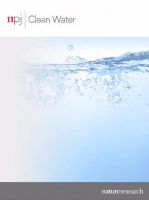
npj Clean Water
Elevating the discourse on water sustainability.npj Clean Water, published by NATURE PORTFOLIO, is a premier open-access journal dedicated to advancing the field of water science and technology. Since its launch in 2018, this innovative publication has quickly established itself as a leading platform for original research and policy discussions concerning clean water access and quality. With an impressive impact factor and categorized in the Q1 Quartile across multiple environmental science disciplines—including management, monitoring, pollution, and waste management—npj Clean Water stands out for its rigorous peer-review process and commitment to disseminating high-quality research. Researchers, professionals, and students involved in water-related challenges will find invaluable insights that address critical environmental issues and promote sustainable practices. Access to articles is freely available, encouraging global collaboration and knowledge sharing within the water sector. This journal embodies a significant step towards achieving innovation and policy advancements in the pursuit of a cleaner, safer water future.
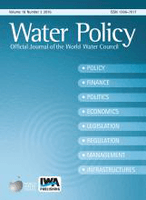
Water Policy
Advancing sustainable water governance for a thriving future.Water Policy is a leading academic journal published by IWA PUBLISHING, dedicated to advancing the understanding of water management and policy across various disciplines. With a focus on the intricacies of water governance, the journal fosters dialogue among researchers and practitioners by presenting innovative studies and comprehensive analyses. Since transitioning to an Open Access model in 2021, it has increased accessibility to critical research, allowing for a broader reach and greater impact within the water sector. The journal's reputation is underscored by its classification in Q2 and Q3 quartiles in fields such as Geography, Planning and Development, as well as Environmental Science disciplines, marking it as a valuable resource for scholars and policymakers alike. The ISSN 1366-7017 and E-ISSN 1996-9759 facilitate streamlined access to its extensive archive, encouraging wider engagement in pivotal discussions surrounding sustainable water practices. With a commitment to shaping the future of water governance, Water Policy stands as an essential platform for sharing vital research and perspectives that contribute to effective water management globally.
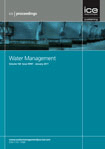
PROCEEDINGS OF THE INSTITUTION OF CIVIL ENGINEERS-WATER MANAGEMENT
Advancing Sustainable Solutions in Water ManagementPROCEEDINGS OF THE INSTITUTION OF CIVIL ENGINEERS-WATER MANAGEMENT is a prestigious journal published by Emerald Group Publishing Ltd, dedicated to advancing the field of water management within civil engineering. With an ISSN of 1741-7589 and an E-ISSN of 1751-7729, this journal delivers peer-reviewed research that spans the critical intersections of water science and technology, contributing valuable insights into sustainable water management practices. As evidenced by its ranking in the 2023 Scopus categories, where it holds the Q3 quartile in Water Science and Technology, and a respectable position among its peers, the journal remains a vital resource for researchers, professionals, and students in the field. Though it is not an open-access journal, it offers accessible subscription options that facilitate worldwide dissemination of knowledge, enhancing its role as a fundamental reference point for cutting-edge developments in water management. For those looking to publish or stay updated on the latest research trends, this journal serves as an essential platform for promoting innovation and sustainable practices in civil engineering and water resources management.

Meteorology Hydrology and Water Management-Research and Operational Applications
Navigating the challenges of water management with rigorous research.Meteorology Hydrology and Water Management - Research and Operational Applications is a prominent academic journal published by the Institute of Meteorology and Water Management, based in Warsaw, Poland. With a focus on advancing the understanding and application of meteorology, hydrology, and water resource management, this journal plays a crucial role in disseminating high-quality research that contributes to both theoretical knowledge and practical applications in these pivotal fields. Although it operates under traditional access options, the journal is dedicated to providing valuable insights and solutions to challenges faced by researchers, practitioners, and policymakers in water management and environmental studies. Researchers keen on exploring innovative methodologies, operational tools, and empirical studies will find this journal an essential resource in enhancing their work and understanding of the dynamic interplay between meteorological phenomena and water resource management. The journal's commitment to maintaining rigorous scholarly standards ensures that every publication drives impactful dialogues within the community and beyond.

Grundwasser
Empowering the next generation of water science leaders.Grundwasser is a prominent academic journal hosted by SPRINGER HEIDELBERG, dedicated to advancing knowledge in the field of water science and technology. With its ISSN 1430-483X and E-ISSN 1432-1165, the journal serves as a crucial platform for disseminating research findings, methodologies, and case studies related to groundwater management, hydrology, and environmental sustainability. Since its inception in 1997 and continuing through 2024, Grundwasser has established itself within the Q3 quartile of the Water Science and Technology category, as recognized by Scopus, ranking #164 out of 261 in Environmental Science. The journal emphasizes rigorous peer-reviewed content, aimed at fostering a deeper understanding of groundwater systems, their ecological implications, and the challenges posed by climate change. Researchers, professionals, and students are encouraged to delve into the latest studies and contribute to this vital area of environmental science, contributing to both academic knowledge and practical applications in groundwater sustainability.

JOURNAL OF THE AMERICAN WATER RESOURCES ASSOCIATION
Advancing water resource management through innovative research.The JOURNAL OF THE AMERICAN WATER RESOURCES ASSOCIATION, published by Wiley, is a premier platform dedicated to advancing the field of water resource management and research. With an ISSN of 1093-474X and an impressive Q1 ranking in multiple categories, including Earth-Surface Processes, Ecology, and Water Science and Technology, this journal serves as a vital resource for professionals, researchers, and students alike. Established in 1967 and set to converge through 2024, it has consistently published cutting-edge research that influences policy and practice in water resource management. The journal's open access option enhances its reach, ensuring that critical findings are accessible to a wider audience. The Scopus rankings further underscore its impact, placing it in the top quartile within its fields, highlighting its importance in shaping scholarly discourse. As a significant contributor to the understanding and management of freshwater systems, the journal offers a crucial means for sharing insights and fostering collaboration in the vital realm of water resources.
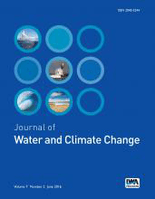
Journal of Water and Climate Change
Empowering Sustainable Solutions for a Changing ClimateJournal of Water and Climate Change is a premier open-access journal published by IWA Publishing, dedicated to advancing the understanding of the interplay between water resources and climate change. With an ISSN of 2040-2244 and an E-ISSN of 2408-9354, this journal has established itself as a crucial platform for interdisciplinary research, publishing high-quality articles that address the challenges posed by climate variability on water systems globally. Since achieving open access status in 2021, the journal has fostered wider dissemination of knowledge among its audience, featuring works that span pivotal topics in Atmospheric Science, Global and Planetary Change, and Water Management. Notably ranked within the top quartiles in several relevant categories as of 2023, it occupies a vital position in the academic community, offering insights that are essential for policymakers, environmental scientists, and researchers striving to create sustainable solutions for water and climate challenges. Its commitment to excellence is reflected in its strong Scopus rankings, standing at the 66th percentile in Water Science and Technology and 65th percentile in Management, Monitoring, Policy, and Law. Located in the United Kingdom, this journal not only serves as a repository of cutting-edge research from 2010 to 2024 but also engages a diverse readership passionate about promoting sustainable water management practices.
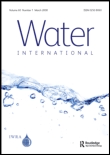
WATER INTERNATIONAL
Pioneering Research for Sustainable Water SolutionsWATER INTERNATIONAL is a leading journal in the realms of water science and policy, published by Routledge Journals, Taylor & Francis Ltd. With its ISSN 0250-8060 and E-ISSN 1941-1707, the journal has maintained a robust scholarly presence since its inception in 1975, with contributions focused on management, monitoring, and policy pertaining to water resources. Currently convening from 1975 to 2024, WATER INTERNATIONAL is recognized for its significant impact, reflected in its Q2 category rankings within Environmental Science sectors—ranked #157/399 in Management, Monitoring, Policy and Law, and #103/261 in Water Science and Technology. The absence of an open access option does not diminish its importance, as it continues to serve as a crucial platform for interdisciplinary researchers, professionals, and students aiming to address the challenges surrounding water governance and sustainability. With its focus on innovative methodologies and policy-oriented research, the journal stands at the forefront of advancing knowledge in water resource management.